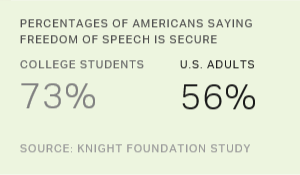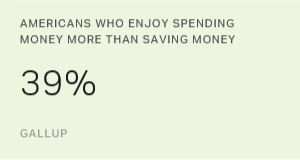Story Highlights
- 73% of students, 56% of adults say free speech is secure in U.S. today
- Students more positive than adults about all five First Amendment freedoms
- Students believe free speech rights stronger than in past; adults disagree
PRINCETON, N.J. -- Social media, student activism and school policies are testing the limits of First Amendment rights on campuses around the country. But a new study, sponsored by the John S. and James L. Knight Foundation in partnership with the Newseum Institute and Gallup, finds U.S. college students feeling more confident than the public as a whole about the security of these rights in the country today. Most notably, three-quarters of college students (73%) believe free speech rights are secure, compared with 56% of U.S. adults overall.
| College students% | U.S. adults% | Difference(pct. pts.) | |||||||||||||||||||||||||||||||||||||||||||||||||||||||||||||||||||||||||||||||||||||||||||||||||
|---|---|---|---|---|---|---|---|---|---|---|---|---|---|---|---|---|---|---|---|---|---|---|---|---|---|---|---|---|---|---|---|---|---|---|---|---|---|---|---|---|---|---|---|---|---|---|---|---|---|---|---|---|---|---|---|---|---|---|---|---|---|---|---|---|---|---|---|---|---|---|---|---|---|---|---|---|---|---|---|---|---|---|---|---|---|---|---|---|---|---|---|---|---|---|---|---|---|---|---|
| Freedom to petition the government | 76 | 58 | 18 | ||||||||||||||||||||||||||||||||||||||||||||||||||||||||||||||||||||||||||||||||||||||||||||||||
| Freedom of the press | 81 | 64 | 17 | ||||||||||||||||||||||||||||||||||||||||||||||||||||||||||||||||||||||||||||||||||||||||||||||||
| Freedom of speech | 73 | 56 | 17 | ||||||||||||||||||||||||||||||||||||||||||||||||||||||||||||||||||||||||||||||||||||||||||||||||
| Freedom of religion | 68 | 60 | 8 | ||||||||||||||||||||||||||||||||||||||||||||||||||||||||||||||||||||||||||||||||||||||||||||||||
| Freedom to assemble peacefully | 66 | 60 | 6 | ||||||||||||||||||||||||||||||||||||||||||||||||||||||||||||||||||||||||||||||||||||||||||||||||
| February-March 2016 | |||||||||||||||||||||||||||||||||||||||||||||||||||||||||||||||||||||||||||||||||||||||||||||||||||
| Knight Foundation "Free Expression on Campus" study | |||||||||||||||||||||||||||||||||||||||||||||||||||||||||||||||||||||||||||||||||||||||||||||||||||
The Free Expression on Campus study finds a similar gap in college students' and U.S. adults' views that freedom to petition the government is secure in the U.S. today (76% vs. 58%, respectively). Additionally, 81% of students versus 64% of all U.S. adults say freedom of the press is secure.
The two groups share similar views about freedom of assembly and freedom of religion, although college students are slightly more confident about the security of those rights as well.
These findings come from two nationally representative surveys -- a March 5-8 telephone survey of 2,031 U.S. adults and a separate Feb. 29-March 15 telephone survey of 3,072 U.S. college students currently enrolled in four-year higher education institutions. Additionally, the study includes a nationally representative telephone survey of 250 U.S. Muslims, interviewed March 4-10.
Racial Gulf in College Students' Perceptions of Freedom of Assembly
Non-Hispanic black college students are less confident than non-Hispanic white college students about the security of all five First Amendment freedoms, but they are especially doubtful about freedom of assembly. Just 39% of black students, compared with seven in 10 white students, say this freedom is secure. In addition to recent student protests over campus race relations -- most notably, at the University of Missouri -- nationwide protests in the past year over police treatment of young black males may be influencing how black students perceive this right.
| Whites% | Blacks% | Difference(pct. pts.) | |||||||||||||||||||||||||||||||||||||||||||||||||||||||||||||||||||||||||||||||||||||||||||||||||
|---|---|---|---|---|---|---|---|---|---|---|---|---|---|---|---|---|---|---|---|---|---|---|---|---|---|---|---|---|---|---|---|---|---|---|---|---|---|---|---|---|---|---|---|---|---|---|---|---|---|---|---|---|---|---|---|---|---|---|---|---|---|---|---|---|---|---|---|---|---|---|---|---|---|---|---|---|---|---|---|---|---|---|---|---|---|---|---|---|---|---|---|---|---|---|---|---|---|---|---|
| Freedom to assemble peacefully | 70 | 39 | 31 | ||||||||||||||||||||||||||||||||||||||||||||||||||||||||||||||||||||||||||||||||||||||||||||||||
| Freedom of speech | 74 | 61 | 13 | ||||||||||||||||||||||||||||||||||||||||||||||||||||||||||||||||||||||||||||||||||||||||||||||||
| Freedom of religion | 69 | 57 | 12 | ||||||||||||||||||||||||||||||||||||||||||||||||||||||||||||||||||||||||||||||||||||||||||||||||
| Freedom of the press | 82 | 73 | 9 | ||||||||||||||||||||||||||||||||||||||||||||||||||||||||||||||||||||||||||||||||||||||||||||||||
| Freedom to petition the government | 78 | 69 | 9 | ||||||||||||||||||||||||||||||||||||||||||||||||||||||||||||||||||||||||||||||||||||||||||||||||
| February-March 2016 | |||||||||||||||||||||||||||||||||||||||||||||||||||||||||||||||||||||||||||||||||||||||||||||||||||
| Knight Foundation "Free Expression on Campus" study | |||||||||||||||||||||||||||||||||||||||||||||||||||||||||||||||||||||||||||||||||||||||||||||||||||
A similar pattern is seen among U.S. adults overall, with 62% of whites versus 45% of blacks saying freedom of assembly is secure. Blacks are also less confident than whites about press freedom (58% vs. 66%, respectively). However, blacks' views regarding the security of freedom of religion, freedom to petition the government and freedom of speech are similar to those of whites.
| Whites% | Blacks% | Dems% | Independents% | Reps% | |||||||||||||||||||||||||||||||||||||||||||||||||||||||||||||||||||||||||||||||||||||||||||||||
|---|---|---|---|---|---|---|---|---|---|---|---|---|---|---|---|---|---|---|---|---|---|---|---|---|---|---|---|---|---|---|---|---|---|---|---|---|---|---|---|---|---|---|---|---|---|---|---|---|---|---|---|---|---|---|---|---|---|---|---|---|---|---|---|---|---|---|---|---|---|---|---|---|---|---|---|---|---|---|---|---|---|---|---|---|---|---|---|---|---|---|---|---|---|---|---|---|---|---|---|
| Freedom of the press | 66 | 58 | 76 | 61 | 59 | ||||||||||||||||||||||||||||||||||||||||||||||||||||||||||||||||||||||||||||||||||||||||||||||
| Freedom to assemble peacefully | 62 | 45 | 67 | 60 | 55 | ||||||||||||||||||||||||||||||||||||||||||||||||||||||||||||||||||||||||||||||||||||||||||||||
| Freedom to petition the government | 59 | 58 | 73 | 56 | 49 | ||||||||||||||||||||||||||||||||||||||||||||||||||||||||||||||||||||||||||||||||||||||||||||||
| Freedom of religion | 58 | 63 | 75 | 63 | 43 | ||||||||||||||||||||||||||||||||||||||||||||||||||||||||||||||||||||||||||||||||||||||||||||||
| Freedom of speech | 57 | 53 | 73 | 53 | 45 | ||||||||||||||||||||||||||||||||||||||||||||||||||||||||||||||||||||||||||||||||||||||||||||||
| February-March 2016 | |||||||||||||||||||||||||||||||||||||||||||||||||||||||||||||||||||||||||||||||||||||||||||||||||||
| Knight Foundation "Free Expression on Campus" study | |||||||||||||||||||||||||||||||||||||||||||||||||||||||||||||||||||||||||||||||||||||||||||||||||||
The study finds sharp differences in perceptions of the status of First Amendment rights by party identification among U.S. adults, with Republicans far less confident than Democrats about the security of all five rights. This is, perhaps, a result of ideological differences in the way the two groups view these rights, but it likely also reflects greater Democratic confidence and Republican cynicism about First Amendment protections under a Democratic president.
The largest difference by party involves freedom of religion: 75% of Democrats versus 43% of Republicans consider this right secure, a 32-percentage-point difference. Large partisan gaps are also seen for freedom of speech and freedom to petition the government. Smaller gaps are seen for freedom of the press and freedom of assembly -- the only two freedoms that the majority of Republicans think are secure today.
In contrast to the pattern among U.S. adults, college students show little partisan differences in their perceptions that First Amendment rights are secure. The one exception, that Republican students (76%) are more likely than Democratic students (60%) to say freedom of assembly is secure, likely reflects the substantial racial gap on this item.
U.S. Muslims' views about the security of First Amendment rights are mostly similar to those of college students; however, Muslims are a bit less confident than students about freedom of the press and freedom of religion. The 60% of Muslims believing freedom of religion is secure is on par with U.S. adults.
U.S. Adults See Greater Deterioration of Free Speech
The study also measured U.S. adults' and college students' perceptions of how free speech rights have changed in the past 20 years. Students are more positive than adults overall regarding the trend in freedom of speech: 40% of U.S. adults, compared with 22% of college students, believe Americans' ability to exercise these rights is weaker today. Conversely, half of college students versus a third of U.S. adults believe it is stronger.
| College students% | U.S. adults% | ||||||||||||||||||||||||||||||||||||||||||||||||||||||||||||||||||||||||||||||||||||||||||||||||||
|---|---|---|---|---|---|---|---|---|---|---|---|---|---|---|---|---|---|---|---|---|---|---|---|---|---|---|---|---|---|---|---|---|---|---|---|---|---|---|---|---|---|---|---|---|---|---|---|---|---|---|---|---|---|---|---|---|---|---|---|---|---|---|---|---|---|---|---|---|---|---|---|---|---|---|---|---|---|---|---|---|---|---|---|---|---|---|---|---|---|---|---|---|---|---|---|---|---|---|---|
| Stronger | 50 | 31 | |||||||||||||||||||||||||||||||||||||||||||||||||||||||||||||||||||||||||||||||||||||||||||||||||
| About the same | 27 | 27 | |||||||||||||||||||||||||||||||||||||||||||||||||||||||||||||||||||||||||||||||||||||||||||||||||
| Weaker | 22 | 40 | |||||||||||||||||||||||||||||||||||||||||||||||||||||||||||||||||||||||||||||||||||||||||||||||||
| No opinion | 1 | 2 | |||||||||||||||||||||||||||||||||||||||||||||||||||||||||||||||||||||||||||||||||||||||||||||||||
| February-March 2016 | |||||||||||||||||||||||||||||||||||||||||||||||||||||||||||||||||||||||||||||||||||||||||||||||||||
| Knight Foundation "Free Expression on Campus" study | |||||||||||||||||||||||||||||||||||||||||||||||||||||||||||||||||||||||||||||||||||||||||||||||||||
These results are mirrored in generational differences among the U.S. adult population. The percentage saying free speech is weaker today is only 29% among all 18- to 29-year-olds, but rises to 39% among those aged 30 to 49 and to 46% among those aged 50 and older.
Bottom Line
U.S. colleges have long been places where open expression and debate are encouraged to further their goals of educating students and teaching them skills to help them be productive and responsible citizens. As such, colleges have a history of being places for activism -- for raising awareness of issues affecting not only students but also the country and world more generally. At the same time, increasing diversity on campuses and in the U.S. can sometimes put free expression rights to the test when that expression is insensitive or hurtful toward members of certain subgroups.
Despite their exposure to these issues at college, most students believe the five rights guaranteed to Americans by the First Amendment are secure in this country today. Further, students are more likely than U.S. adults overall to believe in the security of these rights.
Digging deeper, the study finds that U.S. adults' views are far more influenced by political considerations than are college students', perhaps reflecting Republican adults' greater sensitivity to having a Democratic president in office. But politics alone is not a complete explanation of the difference between college students and adults. In many instances, college students are just as optimistic as Democratic adults, if not more so, about the security of rights such as freedom of the press and freedom of speech. Whatever the reason, college students hold a more optimistic and idealistic view of First Amendment freedoms than U.S. adults do.
Survey Methods
Results for U.S. adults are based on telephone interviews conducted March 5-8, 2016, on the Gallup U.S. Daily tracking survey, with a random sample of 2,031 adults, aged 18 and older, living in all 50 U.S. states and the District of Columbia. For results based on the total sample of U.S. adults, the margin of sampling error is ±3 percentage points at the 95% confidence level.
Results for college students are based on telephone interviews conducted Feb. 29-March 15, 2016, with a random sample of 3,072 U.S. college students, aged 18 to 24, who are currently enrolled full time at four-year institutions. The college sample consists of a random subset of full-time students at 32 randomly selected U.S. four-year colleges that were stratified based on region, enrollment size and private versus public control. For results based on the total sample of college students, the margin of sampling error is ±3 percentage points at the 95% confidence level.
Results for Muslims are based on telephone interviews conducted March 4-10, 2016, with a sample of 250 U.S. adults who were previously interviewed for the Gallup U.S. Daily tracking survey, who identified their religion as Muslim and who agreed to be re-contacted by Gallup for future interviews. For results based on the total sample of Muslims, the margin of sampling error is ±8 percentage points at the 95% confidence level.
Learn more about how the Gallup U.S. Daily works.



